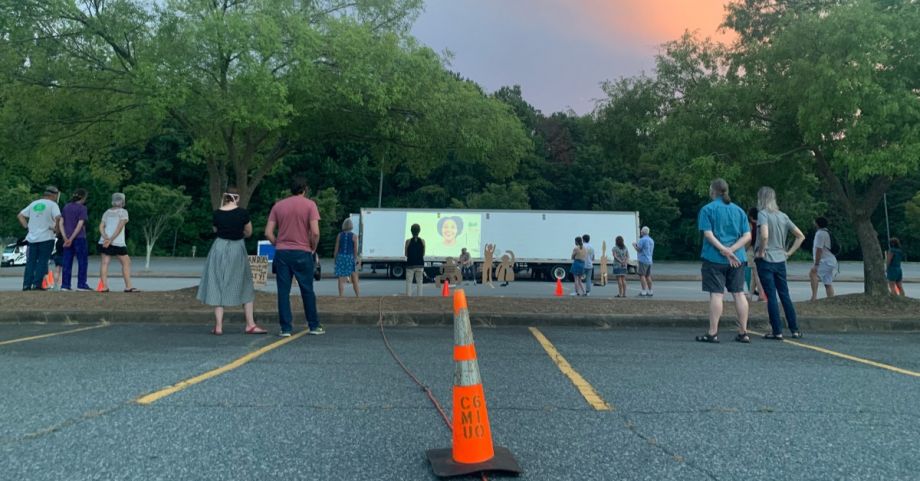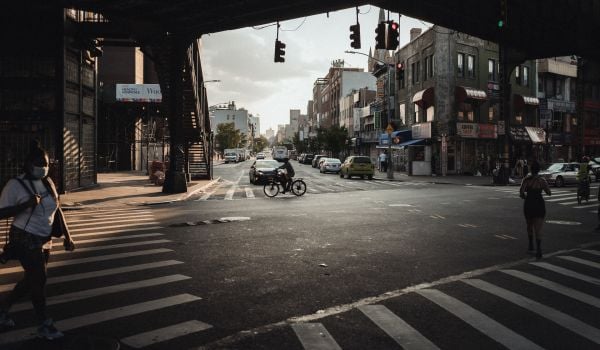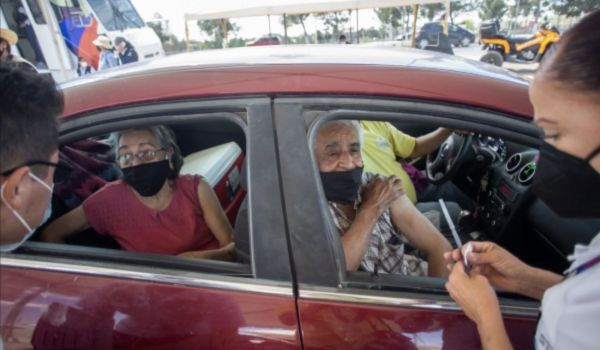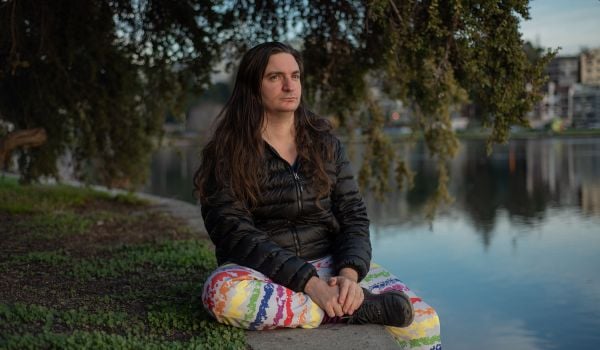Theater occupies a challenging space during this pandemic.
On the one hand, the theater community at large is grappling with the same questions around representation, inclusion, and diversity as many of our other cultural institutions. Leaders in the space are embarking on tough, much-needed conversations around race and white supremacy, with the goal of making progress toward a more diverse, equitable, and just industry.
On the other hand, when it comes to the physical aspect of theater, theater professionals want nothing more than to get back to normal — to the communal experience of sitting in a dark room with a bunch of strangers, all reacting and living through a story together.
Into this confusing space between working for real, systemic change and wanting to reclaim the traditional theater experience — plus the added pressure of needing to bring in some type of revenue — many theater companies are creating unique immersive productions of a type that they would never have tried without the pandemic.
In other words, these companies are taking a different route from producing plays or short films online, or otherwise translating an in-theater experience to Zoom (although there are plenty of outstanding examples of that going on, too).
From a virtual reality production of The Tempest, to a season-long, multi-site-specific storytelling experience in DC, to immersive audio horror experiences, the range of immersive productions occurring is impressive. And it’s encouraging some in theater circles to consider how the pandemic might change immersive theater in the future.
“Immersive theater has been kind of a niche theater vocabulary for a while,” says Steve Kaliski, a visiting professor in the theater department at Davidson College in Davidson, N.C. “Things like [the interactive retelling of Macbeth] Sleep No More have introduced at a very high price what that can be. But I don’t think immersive is this kind of populist theater experience yet.”
Kaliski is among the theater professionals who are exploring new ways of approaching the medium during COVID. He and a group of his students at Davidson created an immersive-style show called Exit 30 in the spring of 2020, which operated as a kind of drive-thru theater.
He devised the show, with the help of colleagues and students, after the college offered a grant to support creative engagement during COVID. “The language of the grant was hinting at Zoom, and these virtual iterations,” Kaliski says. “But seeing our beautiful campus completely empty, we thought, how do we take this gorgeous, massive, empty — basically it’s a park now — with beautiful architecture, and turn it into a performance space? And how do we do that in a way that is rigorously adherent to public health protocols?”
The solution he and his team came up with was to station performers at different spots across the campus, with audience members driving to each of those locations. The show ended with everyone gathering (socially distanced) in a huge sports arena parking lot, with the performers acting out one final scene together.
Each scenes was created by the individual groups of performers, but all were based around the theme of social justice and the reckoning with racism that George Floyd’s murder and the ensuing Black Lives Matter protests had sparked.
The interesting thing about creating that piece, and really any art that works in this particular moment, is that artists have to take a top-down approach. “We worked very much with the container first, the concept,” Kaliski says. “Then we filled in the content.”
At the time, no one was really sure how the show would work. It was still early days in the pandemic — people hadn’t even begun to acclimate yet to the uncertainty, the need to stay home, and all the anxiety and other emotions that accompany this time.
However, the audience’s response “was really heartening. I’ve studied audience responses for so long, and it’s easy to see through it sometimes. Maybe the audience is reacting positively, but you know that you didn’t quite nail it,” says Kaliski. “This felt like gratitude — gratitude to be together, doing something outside. It’s like it almost didn’t matter what the show was. It was rejuvenating.”
Also in the Southeast, the Warehouse Theatre in Greenville, S.C. produced an online show in the form of a fake webinar on decluttering, Objectivity: From Clutter to Clarity with Mary Del Campo. The show was developed by the L.A.-based theater company Mister and Mischief, with the Warehouse partnering to produce and stream it.
Although Mister and Mischief had already conceptualized the general idea for Objectivity for a traditional, in-person show pre-pandemic, the partnership with the Warehouse is what pushed it toward becoming a unique, immersive production.
The Warehouse’s producing artistic director Mike Sablone reached out to the company in June, which is when Sablone realized that in-person theater wouldn’t be happening this year. “I started reaching out to artists for online content — content that would be specific to the form,” Sablone says.
In other words, he wanted more than a stage play that would be broadcast online. The intent was to create something that could only happen online, through a video chat format.
He began talking with Mister and Mischief’s founders Andy and Jeff Crocker about the parameters the Warehouse was looking at.
“I wanted to use Zoom specifically and acknowledge that we’re using Zoom — not pretend we weren’t,” Sablone says. “I also wanted to do something that could be located in someone’s kitchen or dining room, so the actors wouldn’t be pretending they were somewhere they weren’t.”
The result is a remarkably realistic “webinar,” complete with pre-show “registration” and preparation emails that give participants details on how to join, and ask them to bring one object they haven’t touched in six months to the event.
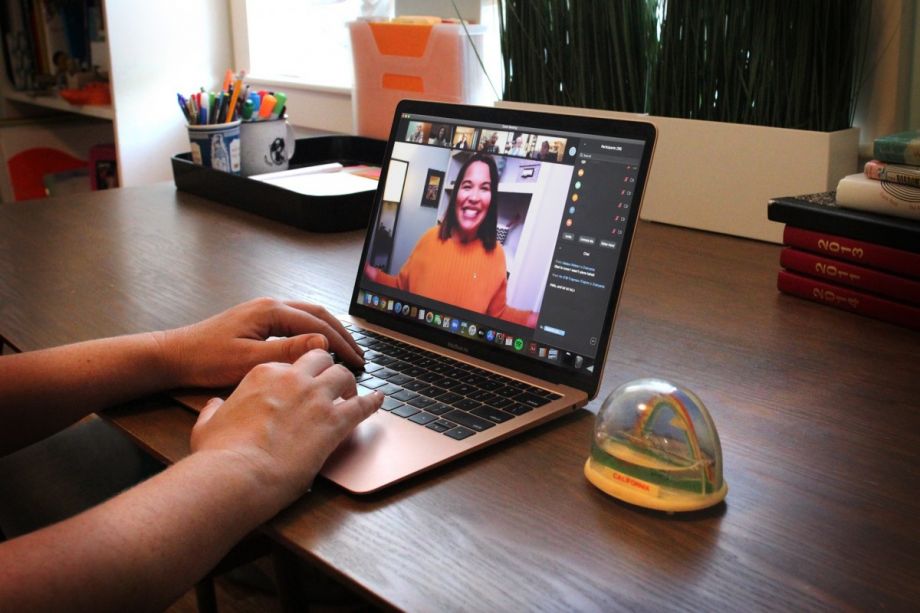
“OBJECTIVITY” was held over Zoom, but it was a play that could only take place on Zoom — something that could only happen online. (OBJECTIVITY photo courtesy of Mister & Mischief)
During the performance, the audience interacts with each other and with Mary Del Campo, the lifestyle guru character who’s leading Objectivity, both through Zoom’s chat and through their microphones. “There’s a lovely message with the show that unfolds gently,” Sablone says. “We’re stuck in our houses, and what constitutes your life right now, might not have a year ago. This takes you on an emotional journey that’s incredibly cathartic.”
The response has been overwhelmingly positive, Sablone says, with some participants even joining them from as far as Australia. Tickets sold so well that the Warehouse extended the show’s run for an additional three weeks.
While Objectivity, Exit 30, and the many other pandemic-era-specific shows happening in different ways are giving theater professionals and patrons a creative way to enjoy the arts right now, that creativity is tinged with some very real melancholy.
“The horribleness of this situation is that theaters are the first to close and will probably be the last to open,” Sablone says. “I hope that, from this time, there emerge moments that we can use to push theater forward in an equitable way. In terms of access, I love how we’ve been able to expand our audience [through Objectivity]. If you have a mobility issue, if you can’t get to the theater, as long as you have an internet connection you can be part of a Warehouse Theatre production. I would love nothing more than to ‘get back to normal’ — but until then, I want to be paying artists and helping people process what they’re going through.”

Elizabeth Pandolfi is a freelance arts and culture journalist. She is the former arts editor of the Charleston City Paper, and her work has appeared in Art and Antiques magazine, Charleston magazine, WNC magazine, and other publications.

